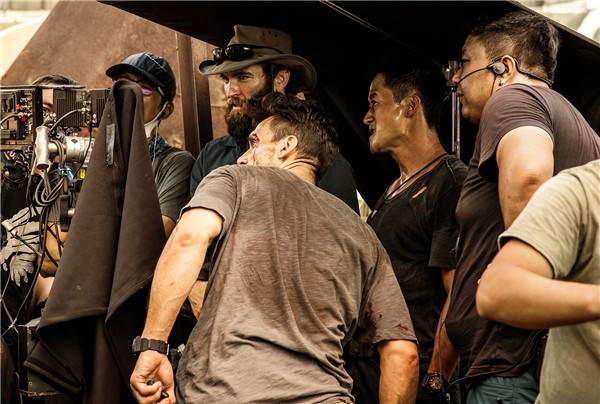Moviemakers help to set the picture straight


The film industry is growing stronger and focusing more on China's rise on the world stage, as Xu Fan reports.
When Jia Zhangke made his directorial debut with The Pickpocket in 1997, annual box-office takings in China were about 1 billion yuan ($158 million). By last year, the figure had rocketed to nearly 56 billion yuan.
When interviewed at the Great Hall of the People on Sunday on the sidelines of the National People's Congress, Jia, an NPC deputy, said he was excited about the transformation of the movie industry in China, which boasts the largest number of film screens in the world.
With revenues from domestic movies accounting for nearly 54 percent of last year's combined box-office total, and the recent Spring Festival holiday seeing a surge of about 67 percent year-on-year, Chinese movies have seen an unprecedented rise, mainly as a result of a number of mainstream blockbusters.
Last year, Wolf Warrior 2 made 5.68 billion yuan to become the highest-grossing fictional movie of all time in China. Meanwhile, Operation Red Sea has soared to become a sensational hit, raking in 3.36 billion yuan since it opened on Feb 16.
'New Mainstream'
For most industry observers and researchers, this box-office bonanza exemplifies the rise of so-called New Mainstream Movies.
The term, coined by film buffs a few years ago, refers to patriotic movies that not only instill positive energy, but also please mass audiences.
With the overwhelming popularity of these hits, including The Taking of Tiger Mountain (2014) and Operation Mekong (2016), the nation's movie industry is being reshaped.
"In the past, movies that publicized conventional values found it hard to win in the mainstream market because most of them were dull and preachy," said Yin Hong, professor of film and television studies at Tsinghua University in Beijing.
"Moreover, for some time, commercial blockbusters barely reflected mainstream values, as most of them were full of negative elements such as materialism, violence and conspiracies."
According to Zhao Baohua, a veteran scriptwriter and movie critic, and deputy director of the Chinese Film Literature Association, the surge in the number of mainstream-value blockbusters indicates that moviemakers have figured out a way to solve the problem - by merging formerly opposing sides, so the movies are educational yet still generate revenue.
Speaking of the huge commercial success of recent mainstream blockbusters, Zhao said the films resonate with Chinese audiences and their pride in the country's rise.
Actor-director Wu Jing's Wolf Warrior 2 is the story of a former Special Forces operative and his heroic face-off with ruthless mercenaries as he evacuates Chinese citizens from a war-torn country in Africa.
Hong Kong director Dante Lam's Operation Red Sea has a similar theme to Wolf Warrior 2 - it was based on the true story of the evacuation of Chinese civilians from strife-torn Yemen in 2015 - but focuses more on depicting the ensemble heroes.
Also directed by Lam, Operation Mekong was based on a cross-border manhunt by Chinese police to apprehend a drugs ring in the Golden Triangle.
Adapted from a hit novel and helmed by Tsui Hark, also from Hong Kong, The Taking of Tiger Mountain tells the tale of a 1940s Communist hero who leads a squad to crack down on a group of bandits.
"Hong Kong directors have worked and grown up in a market that requires movies to be attractive to, and quickly understood by, audiences. Thus, they use their own methods to tell Chinese mainland revolutionary history or show heroes, and make the stories more appealing," Yin said.
- Country to play larger role in protecting displaced people from climate change
- 20m tons of copper resources discovered on Qinghai-Xizang Plateau
- Population of Yangtze finless porpoises increases
- Direct high-speed rail routes link Shaanxi, Hubei with HK
- Chinese customs unveils measures to boost development of western regions
- University icebreaker embarks on Bohai Sea mission





































